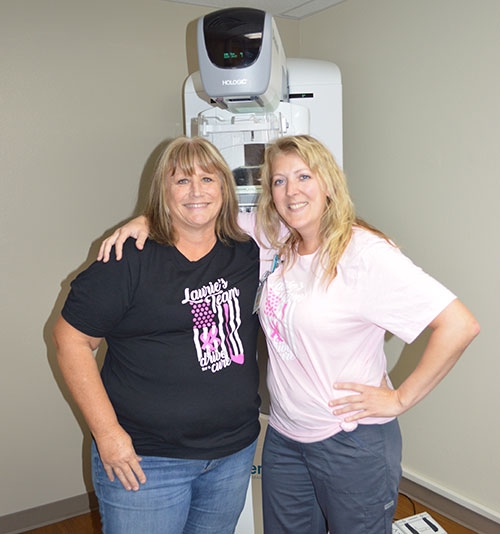You are here
Home ›National Breast Cancer Awareness Month: Questions and Answers about Mammography

3D mammography available at VMH ... October is National Breast Cancer Awareness Month. Pictured is Laurie Moody (left) showing her appreciation to Mammography Technician Renee Stokman (right) next to the 3D mammography machine at Veterans Memorial Hospital (VMH). Over a year ago, Moody had a routine mammogram at the hospital that found she had breast cancer. She went on to the Gundersen Center for Breast Care in La Crosse, WI for further testing and surgery. A year later, Moody is healthy, happy and thankful for the skilled technicians who work locally in the VMH Radiology Department. “I give major kudos to VMH for finding my cancer early with their state-of-the art mammogram machine and skilled technicians. The person who reads the exam is always the one who gets the credit, but it’s the person with the skills to take the good pictures who is really most important,” states Moody. “I encourage all women to not be afraid and get your mammogram and do it annually!” Submitted photo.
From the American Cancer Society and Veterans Memorial Hospital
Breast cancer is the leading cancer diagnosed in women in America. This year, more than 250,000 women will learn for the first time that they have this disease and more than 40,000 women will lose their lives. However, when breast cancer is detected early and treated promptly, suffering and ultimately the loss of life can be significantly reduced.
Women are encouraged to ask their doctors and other health care providers about mammography screening. Mammography (an x-ray picture of the breast) is the single most effective method to detect breast changes that may be cancer, long before physical symptoms of the disease can be seen or felt. Early detection, followed by up-to-date treatment, can provide women with better chances for long-term freedom from the disease. But mammography screening must be done routinely.
As women age, their risk of breast cancer increases. For most women, high-quality mammography screening should begin at the age of 40. As risk factors vary in everyone, the exact frequency of screening should be determined by each woman and her doctor.
In addition to mammography, health care providers should also examine a woman’s breasts (clinical breast examination) as part of regular routine health care to search for any abnormalities that may be missed by mammography. The practice of monthly breast self-examination will alert women to any breast changes that may signal the need for a visit to the doctor.
What are the benefits from mammography screening?
Mammography screening refers to the routine practice of breast evaluation by “x-ray” in women who have no apparent symptoms of breast cancer. Mammography screening seeks to detect breast cancer at early stages of development, resulting in more treatment options. Treatment of early stage breast cancer is not only more effective but potentially less disfiguring and toxic.
Is mammography reliable?
In 1992, the U.S. Congress passed the Mammography Quality Standards Act to ensure that mammography performed at more than 10,000 facilities throughout the country is of high quality and reliable. A certificate issued by the U.S. Food and Drug Administration must be displayed prominently at each facility in order to lawfully perform mammography. The mammography machine at Veterans Memorial Hospital is a state-of-the-art digital 3D mammography machine which is also annually inspected by the Iowa Department of Public Health.
Will Medicare pay for screening mammograms?
Medicare covers mammography screening every year for women age 65 and older. Yet, more than 60 percent of older women do not take advantage of Medicare-covered mammography screening. For more information on Medicare coverage, call Financial Services at Veterans Memorial Hospital in Waukon at 563-568-3411.
For additional information on mammography, call the Veterans Memorial Hospital Radiology Department at 563-568-3411.

